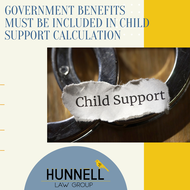 Did you know that if your child receives any type of derivative government benefits (like social security) that amount must be included in the child support worksheet; and if the amount exceeds your total obligation, your child support could be set at $0, retroactive to your date of disability. In the NJ – there is a statute that says child support cannot be terminated retroactive beyond the date of filing of the application or motion for the reduction of child support. Despite this statue the Hunnell Law Group was able to successfully reduce our client’s child support to 2009 and in doing so, we secured a six-figure credit for the overpayment of support. Why/How? Because in addition to emancipation, the receipt of derivative government benefits is an exception to the anti-retroactivity statute and a payor is entitled to relief going back to the date of their first application (or the date of disability, depending on the circumstances). In our case, the appellate division confirmed our argument that when a parent is receiving child support and social security benefits for their children, they are actually being paid twice, which results in a windfall to the parent of primary residence since there is no entitlement to the second payment. In our case, our client on his own, filed a motion for the reduction back in 2009. Unfortunately, the court found that he did not provide all the appropriate paperwork. He tried again in 2010 and again his papers were denied. He essentially gave up and was subject to having is license suspended, passport revoked, and even bench warrants because he simply wasn’t able to afford support. That’s when he found us and we doggedly worked his file because we knew that the just result was a credit. If you want to learn more, click here to read the full case.
0 Comments
 Whether you are contemplating filing for divorce or you have just been served with divorce papers, you should do some preparation before you hire an attorney or file anything with the court. The items listed below may not be all of the documents you need during the divorce process. Additionally, many of the following items may not be applicable to you, but it is important to compile and organize as much as you can. The clearer the picture, the more effective you and/or your attorney will be. Often, one spouse in the marriage assumes the role of record keeper/accountant. If you do not have access to any of these documents, they may become available through your spouse’s filings or during the divorce process through discovery requests. Generally, you should gather:
Additionally, you should prepare documents for each major area of divorce litigation. There are four major areas addressed in a typical divorce: (1) Equitable Distribution; (2) Spousal Support; (3) Child Support; and (4) Child Custody. Equitable Distribution Equitable distribution is how property is distributed between the parties. Virtually all of the property accumulated during the marriage is subject to equitable distribution, with some exceptions. Therefore, you will need to account for the assets and debts accumulated during the marriage. Assets include real property, retirement accounts, and valuable personal property. Debts include credit card debt, mortgages, student debt, etc. If you or your spouse own a business, you should compile tax documents from the business. Again, if you do not have access to any of these documents, don’t worry! They may become available through your spouse’s filings or during the divorce process through discovery requests. Spousal Support/Alimony The court’s main goal in establishing spousal support is equity and fairness. Alimony is not appropriate in every marriage. In New Jersey, the court will weigh a number of factors in establishing whether alimony is appropriate and, if so, what amount is proper. Some of the factors include the length of the marriage, the income of the parties, each party’s age and ability to work, etc. In establishing an alimony award, it is essential that the court receive a full picture of the parties’ incomes. That means that tax documents including W-2’s, 1099’s, and documentation showing supplemental income from rental properties or dividend payments are important. Child Support Child support in New Jersey is calculated through a formula established by state statute. In order to calculate an appropriate amount of child support, you will need to present information including:
Child Custody There are two forms of custody: Legal Custody and Physical Custody. Legal custody allows parents to participate in major decisions for the child including school, religion, medical decisions, etc. Physical custody is where the child physically resides. In many cases, the child resides with one parent for a majority of the time and the other parent is usually afforded parenting time. It is helpful to keep track of the parenting time exercised during separation or during the divorce process in order to establish a parenting time schedule. When parents cannot agree on parenting time or if there is some reason that custody or parenting time should be limited, you must prepare evidence to prove the limitation is in the best interest of the child. This evidence can include police reports, treatment records, photos, videos, written correspondence between the parties, etc. Again, if you cannot find or do not have access to any of this information, it may become available during the discovery process during your divorce. It is important to remember that even the simplest marriage can end in a complicated divorce. Divorce is a give-and-take process that can be difficult and emotional. However, with the right preparation, you can save your self a lot of frustration. Once you have compiled all of your documentation, it will likely be beneficial to speak to an attorney. If you are contemplating a divorce or have just been served with divorce papers, visit hunnelllaw.com/contact to schedule a strategy session with an attorney at The Hunnell Law Group. By Caitlin Holland, Esq. |
Details
Contributors:Stephanie Hunnell, Esq. , Ryan Westerman, Esq. and Caitlin Holland, Esq. Archives
April 2024
Categories
All
|
|
Hunnell Law Group, LLC is conveniently located at 908 Main Street., Asbury Park, NJ 07712
You can contact us at 732-749-3500 or by facsimile at 732-749-3503 Attorneys serving Asbury Park, Avon-by-the-Sea, Belmar, Manasquan, Bradley Beach, Freehold, Toms River, Fair Haven, Red Bank, Manalapan, Marlboro, New Brunswick, Jackson Township, Brick, Howell, Asbury Park, Ocean Township, Eatontown, Wall Township, Neptune City, Neptune Township, Spring Lake, Wanamassa, Lake Como,
Monmouth County, Ocean County, Middlesex County, and Mercer County, in Central New Jersey. |
© 2019, 2020, 2021, 2022, 2023 Hunnell Law Group, LLC, all rights reserved. Disclaimer & Site Map & Privacy Policy.
No aspect of this advertisement has been approved by the Supreme Court of New Jersey.

 RSS Feed
RSS Feed